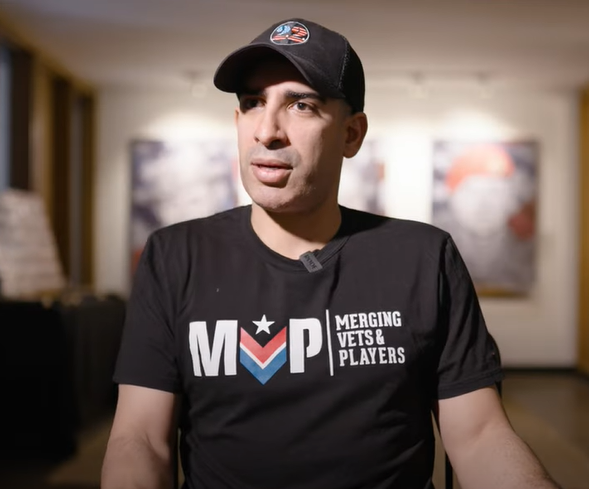Project Enlist
Accelerating TBI, PTSD, and CTE research in the military community.
Project Enlist
Project Enlist is a catalyst for critical research on Chronic Traumatic Encephalopathy (CTE), Post-Traumatic Stress Disorder (PTSD), and traumatic brain injury (TBI) in military veterans and service members.
TBI due to blast injury or exposure, as well as other service-related causes, is a significant problem in the military community. However, the scientific understanding of TBI and related disorders is in its infancy, and we lack both effective treatments and active diagnostic testing for living patients.
Brain bank research is an essential step in developing effective treatments for TBI, CTE, and PTSD so we can protect and support the men and women who courageously defend our nation.
See our FAQ on Project Enlist here.

Pledge your brain to accelerate military CTE research
Project Enlist is recruiting and conducting outreach to the military community to encourage veterans and service members to sign up for the UNITE Brain Bank Research Registry.
World renowned neuropathologist Dr. Ann McKee, director of the UNITE Brain Bank, leads the research effort made possible by pledges to Project Enlist. To date, nearly 2,000 veterans and service members have taken the pledge.
Click here to pledge to donate your brain and join the Clinical Research Registry. If you sign up for the Clinical Research Registry, we’ll keep you informed of clinical studies you may be eligible for.
Click here to review actively recruiting studies that you may be eligible for. By signing up, you can play an active role in helping scientists find treatments for the effects of brain trauma.
Here to support those who sacrificed for us.

Operation Brain Health
Brain injuries don’t control your future. If you’re struggling with TBI or PTSD, or think you may have CTE, there are strategies, tactics, and treatments that can help you feel better today and lower your risk of problems in the future.
Operation Brain Health is our library of brain health resources designed for members of the military community and their loved ones. We’ve recruited a team of top medical experts to share strategies, tips, and advice for navigating life with a brain injury.

The CLF HelpLine
If you or someone you know is a veteran or service member struggling with the effects of brain injuries, the CLF HelpLine is here to support you.
The HelpLine is a free, personalized service that has provided more than 7,000 families with vetted medical recommendations, resources and tips from some of the world’s top brain injury experts, and innovative peer support for both patients and caregivers.
Whether you want help finding a doctor or clinic, want to understand more about brain injuries and CTE, or just want to talk to someone who understands what you’re going through, the CLF HelpLine has your back.

Why brain donation is critical to helping us understand CTE
Brain donation has proven to be an effective accelerator of research on CTE among athletes over the last decade. By showing how CTE has affected hundreds of athletes across multiple sports, we’ve inspired the scientific community to invest in CTE research.
We’ve learned that CTE isn’t just affecting athletes, though. It’s showing up in our nation’s veterans.
Stories of veterans, like Sgt. Kevin Ash, returning home with brain injuries and symptoms of depression, memory loss, and bouts of rage are all too common. We know these changes are symptoms of CTE, but need to know more.
Brain donation allows us to get a better understanding of the unique effects of military brain trauma exposure.

Project Enlist can provide answers after tragedy
Nicole Condrey lost her husband, U.S. Navy Special Warfare veteran Ron Condrey, to suicide in September 2018 after a three-year battle with depression, anger, and impulsiveness. After his death, Nicole donated Ron’s brain to the UNITE Brain Bank as part of Project Enlist. Nicole, formerly the Mayor of Middletown, OH, opened up about her loss and why she believes in Project Enlist in this American Legion feature article.

Medal of Honor recipient Flo Groberg on why he pledged his brain
Medal of Honor recipient Flo Groberg, a retired U.S. Army Captain, has pledged to donate his brain as part of Project Enlist because he sees it as the path to understanding how a traumatic brain injury can impact those who served.
In this video, Flo explains why he sees brain donation and research as a way to save lives.
Nearly 2,000 courageous veterans have taken the pledge so far. If you served our country, Project Enlist is another opportunity to fight with the men and women who have defended it alongside you.
Become a Project Enlist Program Partner
Our Program Partners help power Project Enlist through networking, events, and communications. With their help, we’re creating a culture of brain donation within the military community while also providing a service to veterans through positive brain health messaging.
The Military and TBI:
A growing concern
According to the Department of Defense’s Defense and Veterans Brain Injury Center (DVBIC), between 2000 and late 2019, there were approximately 414,000 traumatic brain injuries (TBIs) among service members worldwide. This number is likely higher due to underreporting and has devastating impacts on our service members.
The most common causes of TBI in veterans include blasts from IEDs, combat-related falls or accidents, and vehicle crashes. These injuries can range from mild concussions to severe brain damage, leading to long-term physical and psychological consequences.
Another major concern is the long-term effects of TBI on the brain. Research has shown that repeated blows to the head, such as those experienced in combat, can lead to CTE and other degenerative brain diseases. These conditions can manifest years or even decades after the initial injury, causing severe cognitive impairment and behavioral changes.
One of the major challenges in addressing TBI and CTE among military members is the lack of awareness and understanding of these conditions. Many service members may hesitate to report their symptoms, fearing it will negatively impact their career or deployment status. In other cases, symptoms may be misdiagnosed or dismissed as common mental health issues.
The prevalence of TBI in veterans has also led to a growing concern for the long-term care and support of these veterans. As they transition back into civilian life, many may struggle with physical disabilities, cognitive impairment, and mental health issues related to their TBI.







